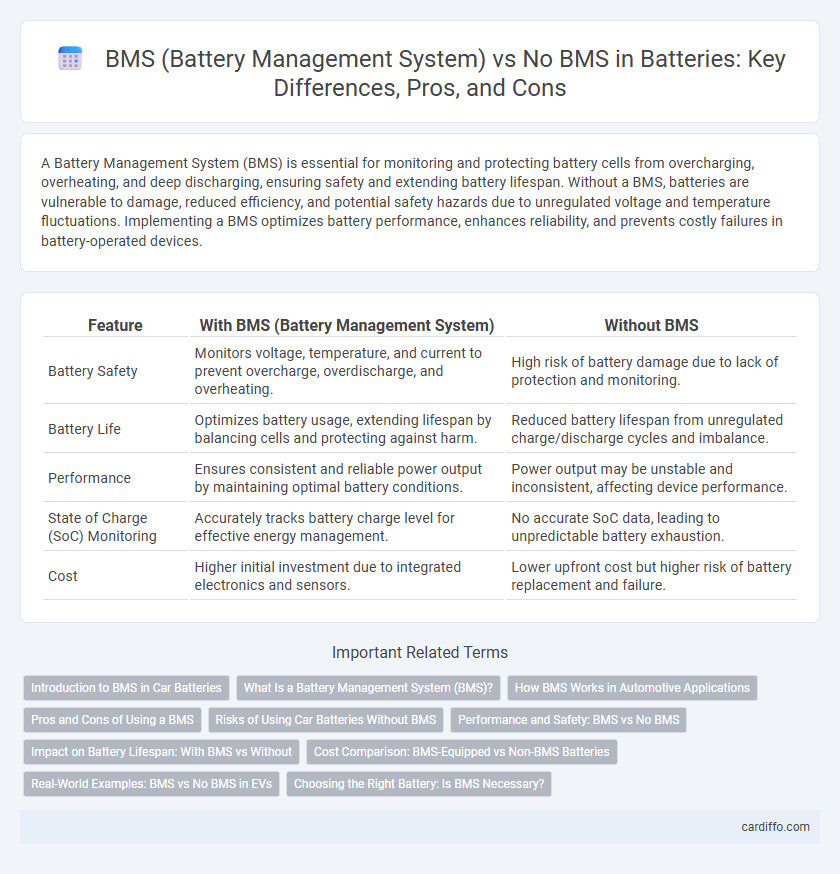A Battery Management System (BMS) is essential for monitoring and protecting battery cells from overcharging, overheating, and deep discharging, ensuring safety and extending battery lifespan. Without a BMS, batteries are vulnerable to damage, reduced efficiency, and potential safety hazards due to unregulated voltage and temperature fluctuations. Implementing a BMS optimizes battery performance, enhances reliability, and prevents costly failures in battery-operated devices.
Table of Comparison
| Feature | With BMS (Battery Management System) | Without BMS |
|---|---|---|
| Battery Safety | Monitors voltage, temperature, and current to prevent overcharge, overdischarge, and overheating. | High risk of battery damage due to lack of protection and monitoring. |
| Battery Life | Optimizes battery usage, extending lifespan by balancing cells and protecting against harm. | Reduced battery lifespan from unregulated charge/discharge cycles and imbalance. |
| Performance | Ensures consistent and reliable power output by maintaining optimal battery conditions. | Power output may be unstable and inconsistent, affecting device performance. |
| State of Charge (SoC) Monitoring | Accurately tracks battery charge level for effective energy management. | No accurate SoC data, leading to unpredictable battery exhaustion. |
| Cost | Higher initial investment due to integrated electronics and sensors. | Lower upfront cost but higher risk of battery replacement and failure. |
Introduction to BMS in Car Batteries
A Battery Management System (BMS) in car batteries monitors cell voltage, temperature, and state of charge to ensure optimal performance and safety. Without a BMS, batteries risk overcharging, deep discharge, and thermal runaway, leading to reduced lifespan and potential hazards. The BMS balances cells and provides real-time data, enhancing battery reliability and efficiency in electric and hybrid vehicle applications.
What Is a Battery Management System (BMS)?
A Battery Management System (BMS) is an electronic system that monitors and manages rechargeable battery cells to ensure optimal performance, safety, and longevity. It regulates charging and discharging processes, balances cell voltages, and protects against overcharging, overheating, and deep discharge. Without a BMS, batteries risk damage, reduced lifespan, and potential safety hazards due to uncontrolled conditions and lack of real-time monitoring.
How BMS Works in Automotive Applications
A Battery Management System (BMS) in automotive applications continuously monitors cell voltage, temperature, and state of charge to ensure optimal battery performance and safety. It balances cell voltages through active or passive balancing techniques to prevent overcharging and deep discharge, extending battery lifespan. Without a BMS, batteries are prone to overheating, capacity loss, and potential failure, significantly compromising vehicle reliability and safety.
Pros and Cons of Using a BMS
A Battery Management System (BMS) optimizes battery performance by monitoring voltage, temperature, and current, preventing overcharging and deep discharge, which enhances battery lifespan and safety. Without a BMS, batteries are prone to imbalance, overheating, and premature failure due to lack of real-time protection and state-of-charge management. The primary downside of using a BMS includes increased system complexity and cost, but these are outweighed by improved reliability and prevention of catastrophic failures.
Risks of Using Car Batteries Without BMS
Using car batteries without a Battery Management System (BMS) significantly increases risks such as overcharging, deep discharging, and thermal runaway, which can lead to reduced battery lifespan and safety hazards. Without BMS monitoring, voltage and temperature imbalances remain unchecked, causing uneven battery cell degradation and potential fire hazards. Ensuring stable performance and safety in automotive applications necessitates integrating a reliable BMS to prevent costly damage and maintain optimal battery health.
Performance and Safety: BMS vs No BMS
A Battery Management System (BMS) optimizes performance by continuously monitoring cell voltage, temperature, and state of charge, preventing overcharging and deep discharging, which extends battery lifespan and ensures reliable power output. Without a BMS, batteries face higher risks of overheating, voltage imbalance, and premature failure, leading to decreased efficiency and potential safety hazards like thermal runaway. Implementing a BMS enhances safety protocols through real-time fault detection and balancing mechanisms, significantly reducing the risk of fire or explosion compared to unregulated battery systems.
Impact on Battery Lifespan: With BMS vs Without
A Battery Management System (BMS) significantly extends battery lifespan by monitoring and controlling critical parameters like voltage, temperature, and state of charge, preventing overcharging and deep discharging. Without a BMS, batteries are prone to premature failure due to unregulated conditions leading to capacity loss and thermal runaway risks. Proper BMS integration enhances overall battery health, reliability, and safety, making it essential for maximizing battery longevity.
Cost Comparison: BMS-Equipped vs Non-BMS Batteries
Batteries equipped with a Battery Management System (BMS) typically incur higher upfront costs due to integrated sensors, controllers, and advanced software algorithms designed to optimize performance and safety. In contrast, non-BMS batteries exhibit lower initial expenses but may face higher long-term costs from potential damage, reduced lifespan, and increased maintenance needs. The overall cost comparison favors BMS-equipped batteries when factoring in enhanced durability, efficiency, and risk mitigation, despite their greater initial investment.
Real-World Examples: BMS vs No BMS in EVs
Battery Management Systems (BMS) in electric vehicles (EVs) enhance safety by preventing overcharging, overheating, and deep discharging, as demonstrated by Tesla's use of advanced BMS to optimize battery life and performance. In contrast, EVs without BMS, such as early conversion kits or DIY projects, face higher risks of battery degradation, reduced range, and potential thermal runaway incidents. Real-world data from Nissan Leaf batteries shows BMS integration extends operational lifespan by up to 30%, highlighting its critical role in EV reliability and efficiency.
Choosing the Right Battery: Is BMS Necessary?
A Battery Management System (BMS) is crucial for monitoring and protecting lithium-ion batteries by regulating voltage, temperature, and state of charge, thus preventing overcharging, overheating, and deep discharge. Batteries without a BMS risk reduced lifespan, safety hazards, and inconsistent performance, especially in high-capacity or multi-cell configurations. Selecting a battery with an integrated BMS ensures optimal efficiency, safety, and longevity, making it essential for applications demanding reliability and precise energy management.
BMS (Battery Management System) vs No BMS Infographic

 cardiffo.com
cardiffo.com